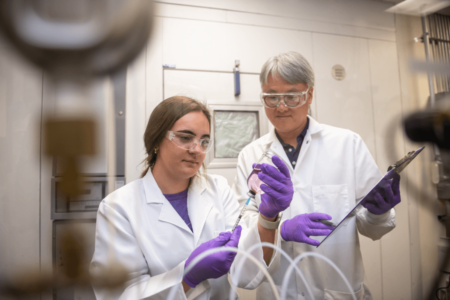
With Earth’s vital resources dwindling and urban populations booming, the need for resilient, sustainable infrastructure has never been greater. This is where the age-old discipline of civil engineering, the architect of our physical world, steps in, designing everything from towering skyscrapers to intricate water systems.
However, the future demands more than just bricks and mortar. Climate change, resource scarcity, and evolving urban landscapes are defining the challenges civil engineers face. Thus, civil engineers of tomorrow must act be adapt, wielding not just steel and concrete but also cutting-edge techs like AI-powered design and bio-inspired materials.
Imagine a time when bridges adapt to earthquakes in real-time, structures actively purify the air for their occupants, and waste transforms into energy. This vision beckons tomorrow’s civil engineers, a generation equipped to tackle the world’s most pressing issues with skills, creativity and purpose.
To thrive as a civil engineer in the future, upskill your expertise at these three universities, which offer some of the top civil engineering programmes today:

The CE-LEM programme has a one-year completion option, with predominantly on-site instruction and up to 25% of credits allowed online. Source: Purdue University
Purdue University
Aspiring civil engineers seeking rapid entry into leadership roles, look no further than Purdue University‘s Lyles School of Civil Engineering Professional Master’s Concentration.
Tailored for career-focused individuals, whether recent university graduates or those with ongoing careers, this accelerated programme empowers them with the skills and expertise to significantly impact industry and government right from the start.
Forget lengthy thesis projects — the Civil Engineering with Leadership, Entrepreneurship, and Management (CE-LEM) programme prioritises practical knowledge and real-world application. Students can earn their master’s in as little as one year through a blend of in-person and online coursework — the latter making up 25% of coursework — allowing for flexible learning while staying connected with the Purdue community.
The CE-LEM curriculum focuses on two key pillars: core courses in management, entrepreneurship, and leadership and specialised electives aligned with your chosen area of expertise. Whether it’s Architectural Engineering, Construction, Environmental or Geomatics, you can tailor your programme to your career aspirations.
Those seeking even greater career acceleration can consider the concurrent MS-MBA programme. This joint offering by the College of Engineering and Mitchell E. Daniels, Jr. School of Business allows you to earn your Master’s in Civil Engineering and an MBA.
Alumni or industry partners provide personalised mentorship, ensuring a smooth transition into the professional world — something Fenil Shah, an alumnus, can attest to. “I enjoyed the blend of opting for Master’s and Business school classes. It helped me grow not only technically but also from a managerial perspective,” Shah says. “I strongly recommend this programme since it not only hones your technical skills but also prepares you for the real world with business school classes and practical learning exposure.”
The Purdue Civil Engineering graduate programme is ranked #7 in the nation by US News & World Report and #2 among online master’s programmes.

At ETH Zurich, the master’s in civil engineering programme empowers students for independent professional work in civil engineering, typically spanning four semesters. Source: ETH Zurich/Facebook
ETH Zurich
In a sleek, modern campus, you’ll find ETH Zurich’s Department of Civil, Environmental and Geomatic Engineering (D-BAUG). Their flagship Master’s programme in Civil Engineering equips students for leadership roles, arming them with the know-how to tackle the practical and scientific challenges of shaping tomorrow’s infrastructure.
Spread across four semesters, the programme offers a unique blend of flexibility and focus. Students craft their own paths, selecting two specialisations from a diverse spectrum — Construction and Maintenance Management, Structural Engineering, Transport Systems, and Hydraulic Engineering and Water Resources Management. A few mandatory courses build foundational knowledge, while electives allow personal interests and aptitudes to flourish.
The curriculum is customisable. Students get to explore theory, sharpen their project management skills in dedicated seminars, and end the programme with a challenging master’s thesis. An optional internship provides more real-world experience, bridging the gap between theory and practice.
The master’s programme extends beyond construction, focusing on the interplay between infrastructure and the environment. It explores sustainable practices, resource management, and the human impact on the planet. Students graduate as skilled engineers, and as responsible stewards of the world they’re shaping.

Imperial College London’s Department of Civil and Environmental Engineering explores environment and water resources, fluid mechanics, geotechnics, and more. Source: Imperial College London
Imperial College London
Imperial College London‘s Department of Civil and Environmental Engineering is ranked second in the UK for Civil Engineering by The Times and Sunday Times Good University Guide 2024. With 75% of its research achieving the highest rating in the Research Excellence Framework 2021, it’s easy to understand why its Master of Science (MSc) programmes draw scores of students each year.
The department offers specialised one-year MSc programmes spanning the breadth of the field. These include the MSc in Advanced Materials for Sustainable Infrastructure, the MSc in General Structural Engineering, the MSc in Hydrology and Water Resources Management, and more. Graduates emerge with deep subject knowledge and honed intellectual and practical skills, making them highly sought-after by employers worldwide.
Modules are also offered as standalone units or in dedicated short courses. They cover areas like Environmental Engineering, Geotechnics, Advanced Structural Engineering and Transport. It’s seamless for professionals to add these modules to their schedules, acquiring valuable expertise without pursuing a full degree.
Those seeking the full Imperial experience will often find themselves in cutting-edge facilities, which include laboratories that are among the best-equipped in Europe. Five fully modernised labs and computing resources provide a great environment for research, teaching, and consultancy. This ecosystem fosters innovation and equips students with the tools to tackle the world’s most pressing civil and environmental challenges. For example, the Structures Laboratory conducts experiments to develop and validate computational methods for predicting the behaviour of multi-body systems in real-world loading conditions.
Whether you’re a seasoned professional looking to refine your skills, or simply curious about the frontiers of sustainable infrastructure, Imperial College London’s Department of Civil and Environmental Engineering offers an ideal platform to realise your ambitions.
*Some of the institutions featured in this article are commercial partners of Study International










